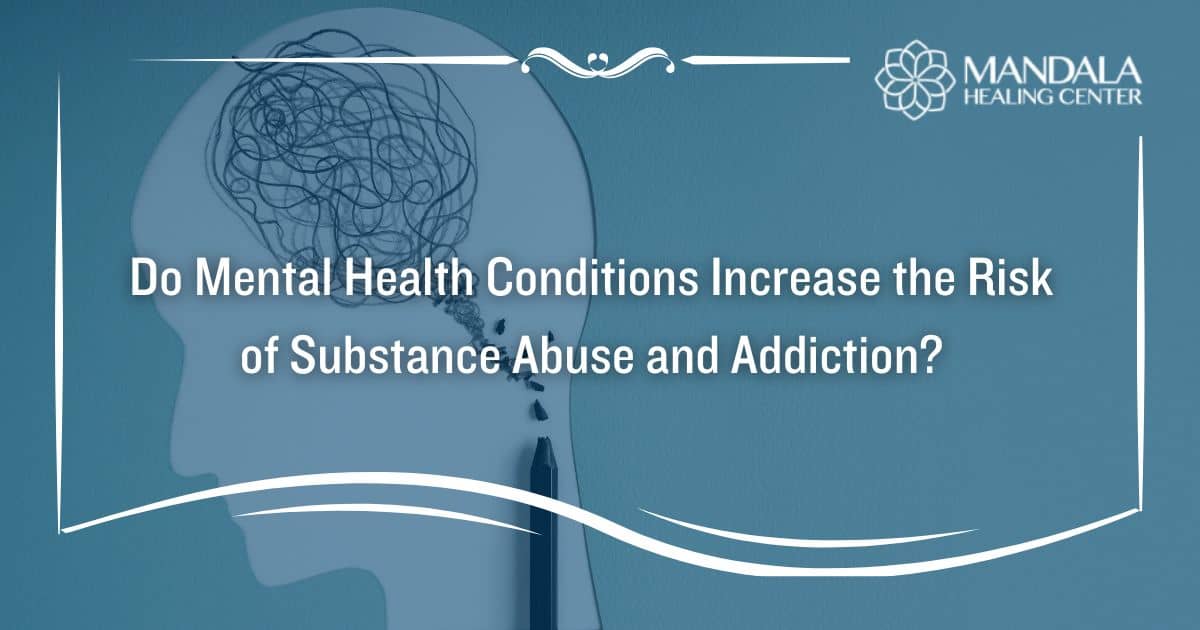Mental health refers to your emotional, psychological, and social well-being. Your mental health can affect how you feel, think, and behave, and is extremely important and can affect every aspect of your life.
The National Institute for Mental Health (NIMH) reports that 1 in 5 U.S. adults suffer from a mental health condition.[1]
Because mental illness is so common, it is important to understand how your untreated symptoms can lead to adverse effects on your life and overall well-being. One of the less discussed risks of untreated mental illness is substance abuse and the development of addiction. Nearly all mental health conditions can increase the risk of substance abuse and addiction.
What are Co-Occurring Disorders?
A co-occurring disorder is a term that is used to describe a mental health condition and a substance use disorder that occurs at the same time. For example, someone with co-occurring disorders might suffer from depression and an addiction to opioids. While co-occurring disorders do not cause one another, the symptoms of each condition can increase the severity of one another.
A few mental health conditions that commonly co-occur with addiction include:[2]
- Anxiety disorders
- Depression
- Attention-deficit hyperactivity disorder (ADHD)
- Bipolar disorder
- Schizophrenia
- Personality disorders
Addiction can co-occur with any mental health condition. You are more likely to develop a substance use disorder when you leave your mental illness untreated.
Why Do Mental Health Conditions Increase Your Risk Of Substance Abuse and Addiction?
Approximately 9.2 million adults in the United States have a co-occurring disorder.[3]
If you have co-occurring disorders, it is important to note that your conditions did not necessarily cause one another. There are several factors to be aware of that could have played a role in the development of your comorbid mental illness and addiction.
The risk factors for co-occurring mental illness and substance use disorder include:[2]
- Genetics – your family history could make you more susceptible to developing addiction and mental illness
- Environmental factors – experiencing trauma or stress at a young age can change your brain chemistry, leading to the development of addiction or mental health issues
- Untreated mental illness – leaving your mental health condition untreated could cause you to self-medicate with drugs or alcohol
- Substance abuse – abusing certain substances can trigger your genetic predisposition to mental illness, causing you to begin experiencing symptoms
Many people with co-occurring disorders have experienced a combination of the risk factors mentioned above. For example, genetics alone usually do not cause you to develop an addiction, but it does increase the risk if other risk factors are present.
Signs of a Substance Use Disorder
If you have a mental health condition and are worried that you developed an addiction to drugs or alcohol it can be difficult to tell because many symptoms of mental illness overlap with the symptoms of addiction.
If you experience any of the following symptoms, you might be dealing with a substance use disorder:[4]
- Having cravings or strong desires or compulsions to use the substance or engage in the behavior.
- The need to use more of the substance or engage in more of the behavior over time to achieve the same effect.
- Unpleasant physical and psychological symptoms occur when the substance use is stopped or reduced.
- Difficulty in controlling the use of the substance or behavior despite negative consequences.
- Despite experiencing negative effects on health, work, relationships, and other areas of life, the person continues to use the substance or engage in the behavior.
- Decreased participation in social, occupational, or recreational activities in favor of substance use or behavior.
- Spending significant time and effort to obtain the substance or engage in the behavior.
- Failing to fulfill important obligations at home, work, or school due to substance use or behavior.
- Using the substance or engaging in the behavior to cope with stress, anxiety, or other negative emotions.
If you experience these symptoms on top of your mental health issues, you could be suffering from co-occurring disorders. When you have a mental illness and an addiction, both conditions must be treated simultaneously to ensure long-term recovery.
How are Co-Occurring Mental Illnesses and Addiction Treated?
Because co-occurring disorders must be treated at the same time, you must seek help from a dual diagnosis treatment program. These programs combine traditional addiction treatment methods with evidence-based mental health therapy to help you manage both conditions long-term.
Dual diagnosis treatment involves:
- Medical detox
- Evidence-based behavioral therapy for mental illness and addiction
- Specialized counseling groups for your mental illness
- Group counseling for substance abuse
- Relapse prevention planning to ensure that you can stay sober outside of the facility
- Medication management for mental illness
- Referrals to additional treatment programs
- Recommendations on self-help groups to attend
The goal of a dual-diagnosis treatment program is to help you get sober while teaching you how to manage your mental illness. This ensures that you will not relapse later on when your mental health symptoms arise.
Find Help for Mental Health and Addiction Today
Dual diagnosis treatment programs like Mandala Healing Center can provide you with the treatment and support you need to recover from your co-occurring disorders. With a combination of evidence-based behavioral therapy, group counseling, and relapse prevention planning, we can help you achieve a strong foundation for recovery.
To learn more about our dual diagnosis treatment program in West Palm Beach, FL, contact Mandala Healing Center today.
References:
- https://www.nimh.nih.gov/health/statistics/mental-illness
- https://www.nimh.nih.gov/health/topics/substance-use-and-mental-health
- https://www.samhsa.gov/medications-substance-use-disorders/medications-counseling-related-conditions/co-occurring-disorders
- https://www.samhsa.gov/mental-health/mental-health-substance-use-co-occurring-disorders












